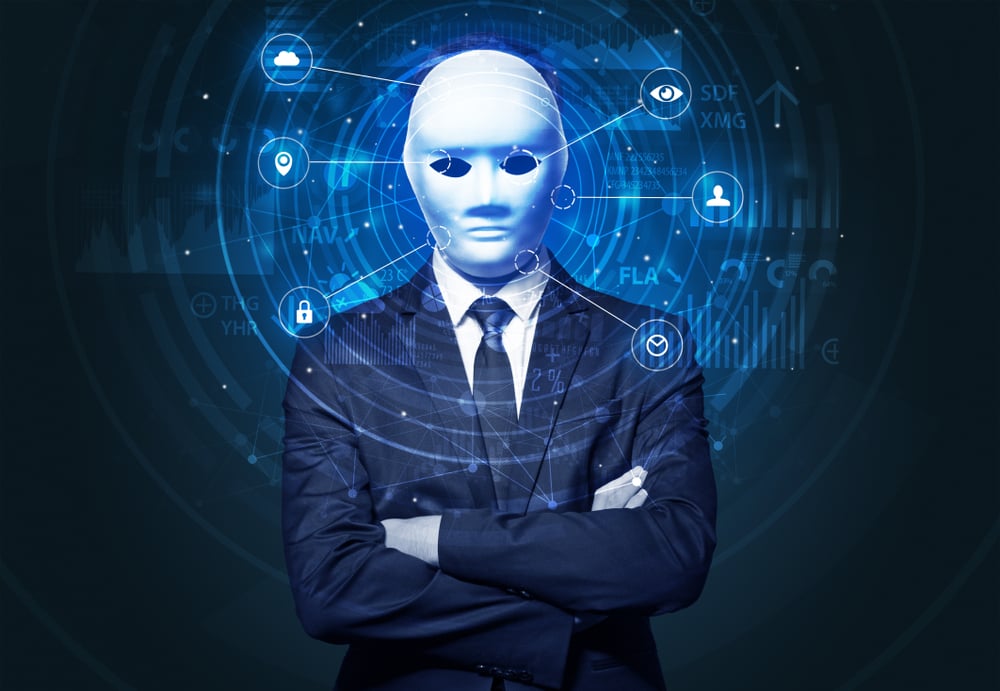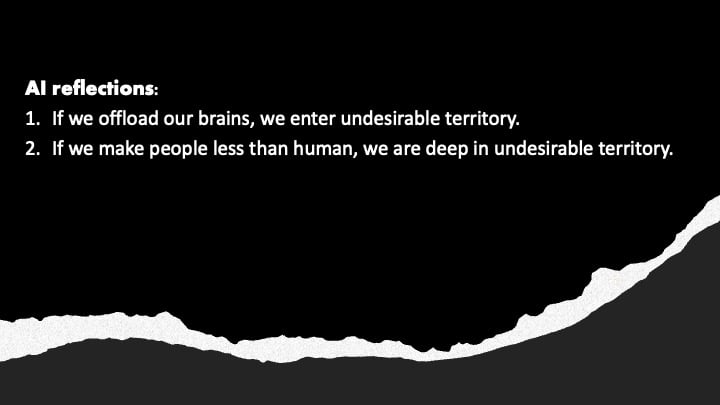
AI is not going away. Our response to it needs to be thoughtful. Those who fancy themselves as trusted advisors alongside you who are accomplished executives need to think long and deeply about the implications.
Most of what I'm currently reading about AI is descriptive or reactionary.
-
Telling us what AI is and how we can use it,
-
and divided between unthinkingly enthusiastic or hostile.
We can only hope that, with time, our thinking and actions will be built on deep and careful reflection, advancing but with awareness and prepared to increase benefits and offset the harm. There is always harm. Harm if we go forward. Harm if we fail to go forward. Maestro-level leadership understands this and wades in, building toward optimal long-term benefit.
In May of this year, I offered my first written reflection on the advance of AI, that if we offload (as opposed to supplement) our brains, we enter undesirable territory. With this brief essay, I'd like to add a second: if AI makes people less human, we are deep in undesirable territory. Friends, we are already there!

The Wall Street Journal recently reported on Kenyan tech workers contracted pre-launch by ChatGPT to review "thousands of graphic text passages, many containing descriptions of violence, harassment, self-harm, rape, child sexual abuse, and bestiality." This is because, as the article says, "to turn a large language model into a useful—and safe—chatbot requires several layers of human input." Humans need to duplicate AI's search capacity for now because AI does not know to distinguish destructive from constructive.
The article describes the travail and mental suffering that weeks and weeks of this effort inflicted on Kenyan workers and their families. Get this logic: so as not to impose on the general public an AI that spontaneously generates filth and slime, workers are paid to enter that horrific space to sort it out. They are paid to have a sub-human experience for us to be free from disgust. Without the WSJ investigative report, we would hardly know about the downstream effects of developing an AI that does not distinguish nor discern between cannibalism recipes and sonnets or germ warfare strategy as morally more repugnant than properly formatted academic footnotes.
But aren't there many professions that take on suffering so the larger population does not have to? And isn't someone taking on this horror a necessary and natural part of being a civilization? What about soldiers, social workers, CNAs, sanitation workers, and police?
Of course, these professions continue. And yes, they agreed to accept money for this work. We intend these professions to bring order to messy and chaotic tasks. But what price do we expect them to pay? Do we want CNAs who scream at actively dying hospice residents because they soiled themselves again? Do we want police who think it normal to kneel on someone's neck? Do we want unjustly treated sanitation professionals to strike while trash and potential disease pile on the street?
We don't. We don't want to have to think about it, either.
Ugliness within civilization is not going anywhere. But with every unthinking and uncalculating advance, we add to the mess. We increase the harm to people we refuse to meet.
In 1987, The Oxford Companion to the Mind offered this insight: "An apparently inescapable feature of human progress is the toll in lives and money that occurs through our imperfect management of the institutions and technologies which we develop. The histories of railways, flying, bridge-building, communications, and political institutions, to name but a few of man's inventions, are replete with examples of costly disasters and harrowing chapters of human misery—part of the price of growing complexity." p.484.
AI is the latest of these. It is sobering to think that in our rush for any individual to be able to make their own Barbie movie and perhaps disintermediate the Hollywood lock on entertainment, hundreds of Kenyan workers will carry explicit memories to their graves.
AI has already become one more way wealthy civilizations offload their trash. It is little different than the trash barges from first world countries dumping and causing harm among populations elsewhere. What we've done so far adds a virtual source that generates this trash with lingering human effects.
Maestro-level leaders care about the thriving of our grandchildren's grandchildren. We pay attention to the downstream effects of what we create, whether they are naturally or virtually streaming.
Tags:
process consulting, Mark L. Vincent, CEO peer-based advising,, Executive peer-based advising, Maestro-level Leaders, The Third Turn, Artificial Intelligence, Third Turn Leaders
Post by
Mark L. Vincent
August 1, 2023
August 1, 2023
I walk alongside leaders, listening to understand their challenges, and helping them lead healthy organizations that flourish.
Comments